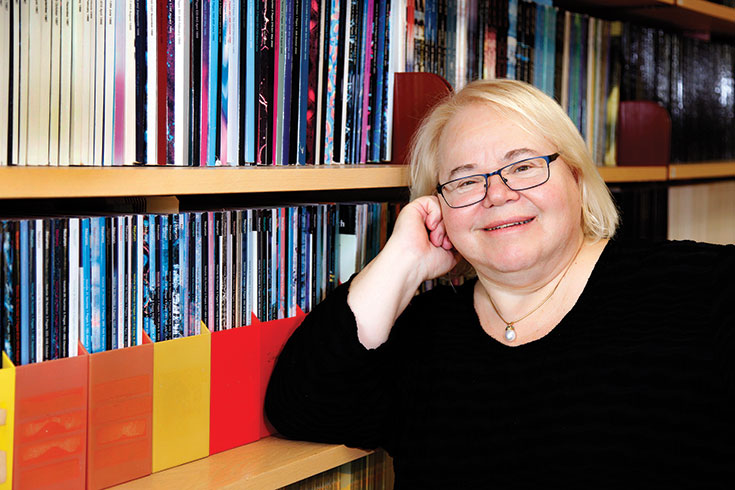‘I Felt I Could Be Myself’

Eve Marder ’69
Part of Exceptional Results
Pioneering neuroscientist Eve Marder ’69 joined the Brandeis faculty as an assistant professor in 1978. She has never left.
“I have stayed at Brandeis largely because of my colleagues,” she wrote in 2016 in an autobiographical essay. They “share a belief that the creation of new knowledge is one of the most important of human endeavors.”
Marder, the Victor and Gwendolyn Beinfield Professor of Neuroscience, and a University Professor, has revolutionized scientists’ understanding of neuronal circuit operation, including how neuromodulators, chemicals that alter the activity of neurons, affect an organism’s behavior. She studies a small network of 30 neurons in the nervous system of lobsters and crabs, which she realized early in her career could serve as a model for understanding the basic properties common to all brains.
She has received numerous prestigious prizes in neuroscience, including the Gruber Prize, the Kavli Prize, and the National Academy of Sciences Award.
In her 2016 essay, Marder remembers doing her first scientific experiment as a kid at a playground, when she wondered whether her head would fit through some railings. Though she got stuck and “felt unbelievably stupid,” it was a revelatory moment nonetheless: “I date this as my first self-conscious awareness of myself as a critical decision-making person.”
Marder discovered her passion for neuroscience as a Brandeis undergraduate when a psychology professor mentioned schizophrenia might be biologically based, the result of electrochemical signals being inhibited in the brain. “I went to the library and read everything I could about inhibition,” she recalled in an interview with the Gruber Foundation. “That’s when I decided to become a neuroscientist.”
When Marder joined the Brandeis faculty, women made up about a third of the biology department. “There was a commitment to social justice and the sense that they didn’t discriminate,” she says. Plus, “Brandeis faculty were always a little bit quirky, so I felt I could be myself.”
In 1981, Marder was eating lunch outside on campus when her newspaper sailed away on a gust of wind. Psychology professor Art Wingfield retrieved it for her. A few months later, they moved in together and eventually married.
Brandeis is also where she met physicist Larry Abbott, GSAS PhD’77. Together, they developed the dynamic clamp, a device now used worldwide to study neurons and neural circuitry.
Over the years, Marder has mentored dozens of scientists. She’s been an especially vocal advocate for women in her field. Her office is adjacent to her lab, and she keeps her door open, even though this invites interruption — she wants to be available to colleagues and students.
She has no plans to retire. “Peeking into the mysteries of life,” she wrote in her 2016 essay, “never gets old.”
